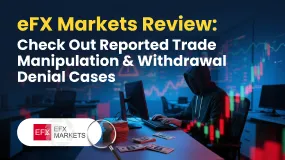Abstract:This article explores how fintech advancements are transforming the forex market and what this means for traders moving forward.

The forex trading landscape is evolving rapidly, driven by the innovative capabilities of financial technology (fintech). As more traders seek efficient, user-friendly, and data-driven solutions, fintech is reshaping market trends and influencing trader behavior in unprecedented ways. This article explores how fintech advancements are transforming the forex market and what this means for traders moving forward.
1. Emergence of Mobile Trading Platforms
One of the most significant shifts in forex trading has been the rise of mobile trading platforms. Fintech companies have developed sophisticated mobile apps that allow traders to execute trades, monitor market movements, and access real-time data from anywhere in the world. This accessibility has democratized forex trading, enabling a broader demographic of traders to participate in the market.
Impact on Trader Behavior:
Increased Participation: With the ability to trade on the go, more individuals are entering the forex market, leading to greater market liquidity.
24/7 Trading: Traders are no longer confined to traditional trading hours, resulting in a more dynamic market environment.
2. Automation and Algorithmic Trading
The integration of automation and algorithmic trading in the forex market has changed how traders execute their strategies. Fintech innovations have made it easier for traders to develop and implement algorithms that can analyze market trends and execute trades based on predefined criteria.
Impact on Trader Behavior:
Enhanced Efficiency: Traders can automate their strategies, reducing the need for constant monitoring and allowing for quicker execution during market fluctuations.
Data-Driven Decisions: Algorithms leverage vast amounts of data, enabling traders to make informed decisions based on real-time analysis rather than emotional responses.
3. Artificial Intelligence and Machine Learning
Artificial intelligence (AI) and machine learning are revolutionizing how traders approach forex markets. These technologies can analyze historical data, identify patterns, and provide predictive analytics that help traders forecast market movements.
Impact on Trader Behavior:
Improved Forecasting: AI-driven tools enable traders to anticipate trends more accurately, leading to more strategic trading decisions.
Personalized Trading Experiences: Fintech platforms can tailor recommendations based on individual trading behaviors, preferences, and risk profiles, enhancing the overall trading experience.
4. Blockchain Technology and Decentralized Finance (DeFi)
Blockchain technology is beginning to make waves in the forex trading space, offering greater transparency and security. Decentralized finance (DeFi) platforms are emerging, allowing traders to engage in peer-to-peer trading without intermediaries, which can lower costs and enhance transaction speeds.
Impact on Trader Behavior:
Lower Costs: By eliminating intermediaries, traders can benefit from reduced fees, making trading more accessible.
Increased Trust: The transparency provided by blockchain technology can enhance trader confidence, particularly in an industry that has faced scrutiny over security and regulatory issues.
5. Social Trading and Community Engagement
Fintech has introduced social trading platforms that allow traders to share insights, strategies, and performance. These platforms enable less experienced traders to learn from seasoned professionals by following their trades or copying their strategies.
Impact on Trader Behavior:
Collaborative Learning: Traders are more inclined to engage in community discussions, leading to a more collaborative trading environment.
Confidence Boost: Social proof from successful traders can encourage novice traders to participate in the forex market, reducing the intimidation factor associated with trading.
Conclusion
As fintech continues to advance, its influence on forex trading will only grow stronger. The shift toward mobile accessibility, automation, AI integration, blockchain technology, and social trading platforms is not just enhancing the trading experience but also changing how traders behave in the market. For those involved in forex trading, embracing these fintech innovations will be crucial for staying competitive in an ever-evolving landscape.
The future of forex trading is bright, with fintech at the forefront, promising a more inclusive, efficient, and data-driven trading environment. As we move forward, traders who adapt to these changes will likely find themselves better equipped to navigate the complexities of the forex market.










